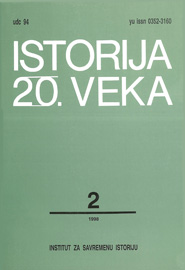USPON I PAD JUGOSLOVENSKO-SOVJETSKIH ODNOSA 1956. GODINE
SOVIET - YUGOSLAV RELATIONS IN 1956.
Author(s): Đoko TripkovićSubject(s): Diplomatic history, Recent History (1900 till today), Post-War period (1950 - 1989), History of Communism
Published by: Institut za savremenu istoriju, Beograd
Keywords: Yugoslavia; USSR; international relations; normalization; 1956; destalinization; communists;
Summary/Abstract: The process of normalizing Soviet-Yugoslav relations after the break in 1948 included the particularly delicate question of renewing ties between the countries’ communist parties, which was additionally hampered by the considerable ideological and political differences dividing them. The normalization of relations between the countries in 1955, as well as the abolishment of the personality cult and the intended destalinization of the USSR and other communist countries proclaimed at the 20th Congress of the Soviet Communist Party, created favorable conditions for mending the relations between the two parties. The most important event in connection to this took place in June 1956 when, on the occasion of the visit of a Yugoslav party and government delegation led by J. B. Tito, the Moscow Declaration was signed, guaranteeing equality between parties and the right of each communist party to apply its own model of socialism. This document signified the triumph of Tito’s policy, and marked the highest point in Soviet-Yugoslav relations and of the process of destalinization in the communist camp. Immediately after this agreement, however, heavy social unrest began in Poland, leading to bloodshed in Poznan and pointing to a similar course of events in Hungary. Faced with the risk that the new process of democratization might bring to the cohesion of the Eastern bloc, the Soviet leadership hastily reverted to the old centralistic control over the satellite countries and their parties. This decision required that the uncommon position of the Yugoslav party, country and leadership be made to look less appealing to the other communist countries. The relations between the Soviet Union and Yugoslavia, noticeably cooler at the end of the summer, rapidly deteriorated during and after the revolutionary events in Hungary in the autumn. By the end of the year the relations between the communist parties of the two countries had declined to the point at which they had been before the 20th Congress of the Soviet Communist Party. The regression in relations reflected, on the one hand, Yugoslavia’s defense of its independent position between the two blocs, which Tito had already achieved, and, on the other, the inability of the Soviet leaders to find a different way, other than that of insisting on ideological uniformity, of keeping the socialist camp together and of maintaining their own dominant position in it.
Journal: Istorija 20. veka
- Issue Year: 1998
- Issue No: 2
- Page Range: 129-141
- Page Count: 13
- Language: Serbian

